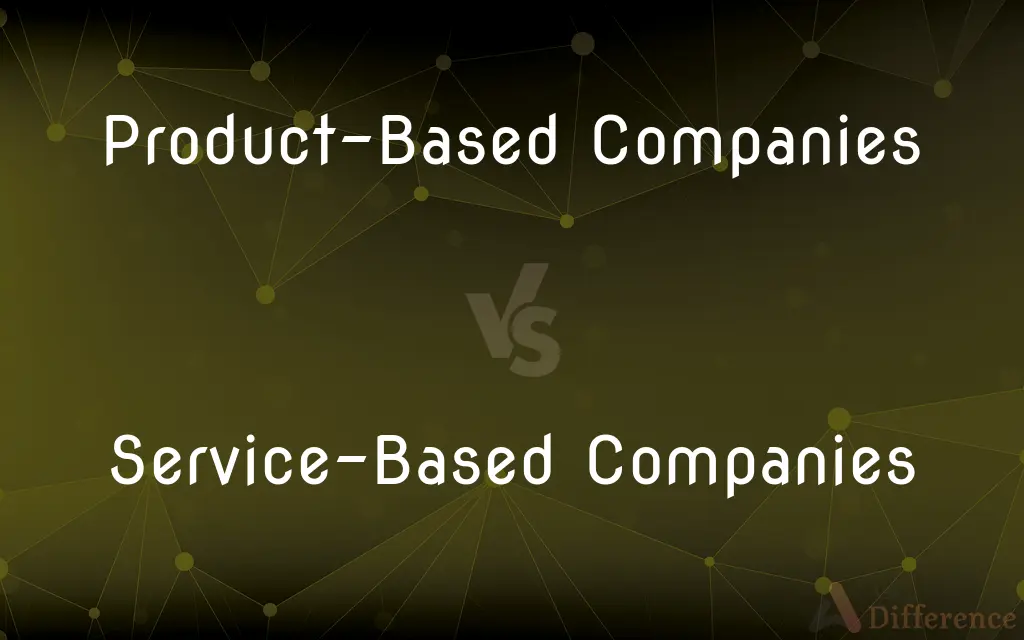Product-Based Companies vs. Service-Based Companies — What's the Difference?
By Tayyaba Rehman — Published on December 10, 2023
Product-Based Companies focus on creating products, while Service-Based Companies offer specialized services.

Difference Between Product-Based Companies and Service-Based Companies
Table of Contents
ADVERTISEMENT
Key Differences
Product-Based Companies design, manufacture, and market tangible or intangible products for consumers. These companies emphasize innovation and invest heavily in research and development. Service-Based Companies, on the other hand, offer a wide array of professional services, from consulting to maintenance, and rely on client relationships and service quality.
Product-Based Companies often operate on a model where they sell a product, either one-time or recurring. Their revenue is mainly derived from these sales. Service-Based Companies depend on contracts, retainers, or hourly rates, and their revenue is derived from the services rendered to their clients.
In Product-Based Companies, once a product is developed, it can be sold to an infinite number of customers without significant incremental costs. In contrast, Service-Based Companies often face scalability challenges, as offering more services typically means hiring more personnel.
Product-Based Companies generally have a clear tangible output, be it software, gadgets, or any physical product. This product remains consistent across all customers. Service-Based Companies tailor their offerings based on individual client needs, making their output more variable.
Branding and marketing strategies differ between the two. Product-Based Companies focus on the features and benefits of their products. Service-Based Companies emphasize their expertise, customer service, and the unique value they bring.
ADVERTISEMENT
Comparison Chart
Primary Offering
Tangible or intangible products
Professional services
Revenue Model
Sales of products
Contracts, retainers, hourly rates
Scalability
Can sell to many without extra cost
Often requires more personnel
Output Consistency
Consistent product for all customers
Tailored to individual client needs
Marketing Focus
Product features and benefits
Expertise and customer service
Compare with Definitions
Product-Based Companies
Product-Based Companies are businesses that design and manufacture products for sale.
Apple, a Product-Based Company, sells iPhones globally.
Service-Based Companies
Service-Based Companies offer professional expertise to their clients instead of tangible products.
Deloitte, a Service-Based Company, provides consulting services.
Product-Based Companies
Product-Based Companies develop solutions that are tangible or digital and market them to consumers.
Microsoft, a Product-Based Company, offers Windows OS to users.
Service-Based Companies
Service-Based Companies rely on skilled professionals to deliver value.
Mayo Clinic, a Service-Based Company, offers medical expertise.
Product-Based Companies
Product-Based Companies focus on innovating and creating goods either for consumer or enterprise use.
Tesla, a Product-Based Company, designs electric vehicles.
Service-Based Companies
Service-Based Companies generate revenue through contracts or hourly charges for services rendered.
Law firms, as Service-Based Companies, bill clients for legal advice.
Product-Based Companies
Product-Based Companies invest heavily in research and development to stay competitive.
Samsung, a Product-Based Company, continually updates its smartphone lineup.
Service-Based Companies
Service-Based Companies prioritize client relationships and custom solutions.
Accenture, a Service-Based Company, tailors its strategies to individual business needs.
Product-Based Companies
Product-Based Companies derive their main revenue from the sales of their created products.
Sony, a Product-Based Company, profits from selling PlayStation consoles.
Service-Based Companies
Service-Based Companies might not have physical products but offer valuable services that fulfill specific needs.
Netflix, a Service-Based Company, streams content to users.
Common Curiosities
What do Product-Based Companies primarily sell?
Product-Based Companies primarily sell tangible or intangible products.
Which type of company typically faces more scalability challenges?
Service-Based Companies often face more scalability challenges as they grow.
Can Service-Based Companies offer digital solutions?
Yes, many Service-Based Companies provide digital solutions, like online marketing or cloud services.
How do Service-Based Companies generate their revenue?
Service-Based Companies generate revenue through services rendered, often via contracts, retainers, or hourly rates.
Do Product-Based Companies always sell physical items?
No, Product-Based Companies can sell digital products, such as software or online content.
Are Service-Based Companies limited to consulting?
No, Service-Based Companies span various sectors, including healthcare, entertainment, IT, and more.
What drives innovation in Product-Based Companies?
The need to stay competitive and meet consumer demand often drives innovation in Product-Based Companies.
How do Service-Based Companies ensure quality?
They rely on skilled professionals, training, and feedback to ensure high-quality service.
How do marketing strategies differ between the two?
Product-Based Companies focus on product features, while Service-Based Companies highlight expertise and customer service.
Is customer relationship more crucial for Service-Based Companies?
While important for both, Service-Based Companies often rely more heavily on maintaining strong client relationships.
Can a company be both product-based and service-based?
Yes, many companies offer both products and related services to their customers.
What's a major benefit for Product-Based Companies?
Once developed, a product can be sold multiple times without significant additional costs.
Do Product-Based Companies always require a physical storefront?
No, many Product-Based Companies operate online or through distributors.
Do Service-Based Companies always charge hourly?
No, they can have various billing methods, including flat fees, retainers, or project-based charges.
Which type of company typically has a more variable output?
Service-Based Companies often tailor their offerings, making their output more variable compared to Product-Based Companies.
Share Your Discovery

Previous Comparison
18k Gold vs. 24k Gold
Next Comparison
DVI vs. HDMIAuthor Spotlight
Written by
Tayyaba RehmanTayyaba Rehman is a distinguished writer, currently serving as a primary contributor to askdifference.com. As a researcher in semantics and etymology, Tayyaba's passion for the complexity of languages and their distinctions has found a perfect home on the platform. Tayyaba delves into the intricacies of language, distinguishing between commonly confused words and phrases, thereby providing clarity for readers worldwide.












































